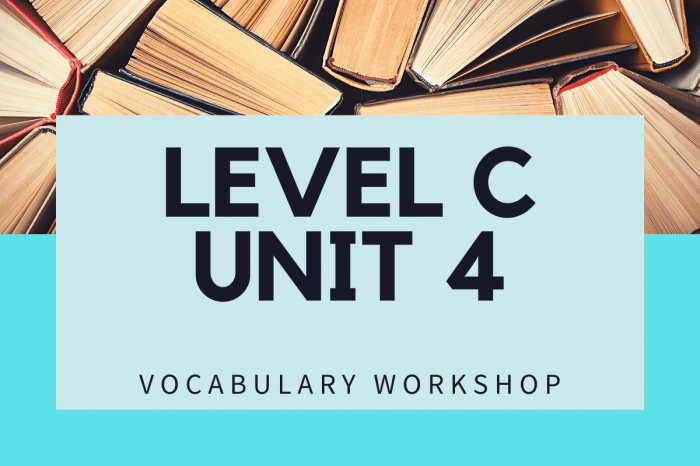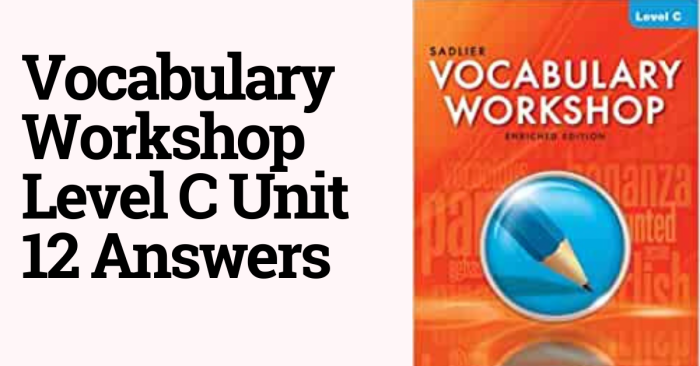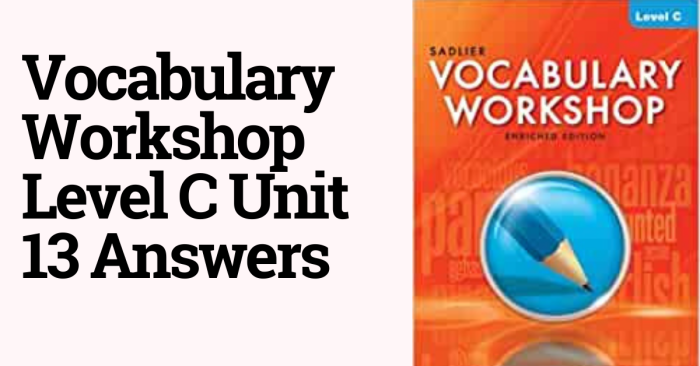Embark on an exciting linguistic journey with Vocab Workshop Level C Unit 6, where words come alive and meanings unfold. Dive into a treasure trove of vocabulary acquisition strategies, word analysis techniques, and practical exercises that will expand your linguistic horizons.
This unit is meticulously designed to cater to your learning needs, empowering you to master new words, comprehend their nuances, and apply them effectively in various contexts. Prepare to enhance your vocabulary and communication skills to new heights.
Unit Overview

Unit 6 of Vocabulary Workshop Level C delves into the realm of figurative language, where words transcend their literal meanings to create vivid imagery and evoke emotions. Students will explore various types of figurative language, including metaphors, similes, personification, and hyperbole, and learn to identify and interpret their significance in literary works.
This unit is designed for students with a foundational understanding of vocabulary and language comprehension. By engaging with the concepts of figurative language, students will enhance their ability to analyze and appreciate literary texts, deepen their vocabulary, and develop their creative writing skills.
Types of Figurative Language
Figurative language encompasses a wide range of techniques that authors use to enhance the impact and meaning of their writing. In this unit, students will explore the following key types:
- Metaphors: Comparing two unlike things without using “like” or “as” (e.g., “Life is a journey”)
- Similes: Comparing two unlike things using “like” or “as” (e.g., “Her eyes sparkled like stars”)
- Personification: Giving human qualities to non-human things (e.g., “The wind whispered secrets”)
- Hyperbole: Exaggeration for emphasis (e.g., “I’m so hungry I could eat a horse”)
Vocabulary Acquisition Strategies

Mastering vocabulary is crucial for effective communication and comprehension. Let’s explore proven strategies to enhance your vocabulary acquisition.
To effectively acquire new words, employ a combination of techniques:
Context Clues
Surrounding sentences and paragraphs often provide hints about the meaning of unfamiliar words. Pay attention to context clues like synonyms, antonyms, examples, or definitions.
Root Words
Understanding root words can help decipher unfamiliar words. Study the origins of words to grasp their fundamental meaning and expand your vocabulary.
Vocab Workshop Level C Unit 6 is an excellent resource for expanding your vocabulary. It’s not always easy to find real-world examples of the words you’re learning, but the Spivey v. Battaglia case brief provides a fascinating glimpse into the legal system and the challenges of interpreting the law.
Whether you’re a lawyer or just interested in learning more about the law, this case brief is worth checking out. It’s a great way to see how the words you’re learning are used in context, and it can help you understand the legal system better.
Flashcards
Flashcards are a classic tool for memorizing and reviewing new words. Write the word on one side and its definition or an example on the other.
Spaced Repetition
Reviewing new words at increasing intervals helps reinforce them in your memory. Use spaced repetition apps or create your own schedule to maximize retention.
Active Recall, Vocab workshop level c unit 6
Instead of passively reading definitions, actively recall words from memory by writing them down, using them in sentences, or testing yourself with flashcards.
Word Analysis and Contextual Understanding
Word analysis and contextual understanding are crucial skills for expanding vocabulary. By breaking down words into their components and examining them in context, we can unlock their meanings and enhance our comprehension.
Prefixes, Suffixes, and Root Words
Prefixes and suffixes are affixes that are added to the beginning or end of root words, respectively, to modify their meaning. Understanding these affixes allows us to decode unfamiliar words and expand our vocabulary.
- Prefixes: Examples include “un-” (not), “re-” (again), and “pre-” (before).
- Suffixes: Examples include “-tion” (action), “-ment” (result), and “-able” (capable of).
- Root Words: Root words are the core meaning-carrying elements of words. Identifying root words helps us connect new words to familiar concepts.
Contextual Understanding
Context provides valuable clues to the meaning of unfamiliar words. By examining the surrounding words, sentences, and paragraphs, we can infer the meaning of unknown terms.
- Definition Clues: Words or phrases that explicitly define the unfamiliar term.
- Synonym Clues: Words or phrases that provide a synonym for the unfamiliar term.
- Contrast Clues: Words or phrases that provide a contrast to the unfamiliar term.
- Example Clues: Words or phrases that provide an example of the unfamiliar term.
Vocabulary in Practice
This section provides exercises and activities that help reinforce vocabulary learning, ensuring that students can apply the words they have learned in various contexts.
These exercises and activities include:
Fill-in-the-Blank Exercises
Fill-in-the-blank exercises are a great way to test students’ understanding of vocabulary words. In these exercises, students are given a sentence with one or more missing words. They must then fill in the blanks with the correct vocabulary words.
- Example: The ________ of the building was impressive.
- The correct answer is “facade”.
Vocabulary Expansion and Application: Vocab Workshop Level C Unit 6
Vocabulary expansion is crucial for enhancing language proficiency. It enables us to express ourselves more precisely and comprehend complex ideas. This unit aims to equip you with strategies for expanding your vocabulary and using new words effectively.
Encouraging Exploration
Reading, writing, and speaking are powerful tools for vocabulary expansion. Engage in these activities regularly to encounter new words and reinforce existing ones. Make a conscious effort to note unfamiliar words and explore their meanings.
Strategies for Expansion
- Contextual Learning:Infer the meaning of unfamiliar words from the surrounding context.
- Root Words and Affixes:Break down words into their root words and affixes to deduce their meanings.
- Synonyms and Antonyms:Explore synonyms and antonyms to understand the nuances of words.
- Dictionaries and Thesauruses:Utilize dictionaries and thesauruses to find definitions, pronunciations, and alternative word choices.
Using New Words Effectively
- Practice Regularly:Use new words in conversation, writing, and reading to reinforce their meaning.
- Seek Feedback:Ask for feedback from native speakers or language experts to ensure correct usage.
- Avoid Overuse:While it’s important to use new words, avoid excessive or unnatural use that may sound awkward.
Assessment and Evaluation

Evaluating students’ vocabulary acquisition and understanding is crucial for assessing their progress and providing tailored feedback. This assessment plan Artikels clear criteria and mechanisms to measure students’ vocabulary growth.
Assessment Plan
- Formative Assessments:Regular quizzes, class discussions, and vocabulary games to monitor students’ ongoing progress and identify areas for improvement.
- Summative Assessments:Unit tests and end-of-course exams to evaluate students’ overall vocabulary knowledge and application skills.
- Portfolio Assessment:Collection of students’ vocabulary notebooks, word lists, and creative writing assignments to track their progress and demonstrate their vocabulary expansion.
Grading Criteria
- Accuracy:Correct understanding and usage of vocabulary words in various contexts.
- Depth of Knowledge:Demonstrating a comprehensive understanding of word meanings, including synonyms, antonyms, and shades of meaning.
- Application:Using vocabulary words effectively in writing, speaking, and critical thinking tasks.
Feedback Mechanisms
- Verbal Feedback:Providing immediate feedback during class discussions and activities.
- Written Feedback:Giving detailed comments on assignments and assessments to help students identify areas for improvement.
- Peer Feedback:Encouraging students to provide constructive feedback to each other on their vocabulary usage.
Key Questions Answered
What is the target audience for Vocab Workshop Level C Unit 6?
This unit is designed for learners who seek to enhance their vocabulary and communication skills.
What are the key concepts covered in this unit?
The unit covers effective vocabulary acquisition techniques, word analysis, contextual understanding, and practical vocabulary application.
How is vocabulary acquisition assessed in this unit?
Your vocabulary acquisition and understanding will be evaluated through exercises, activities, and a comprehensive assessment plan.
